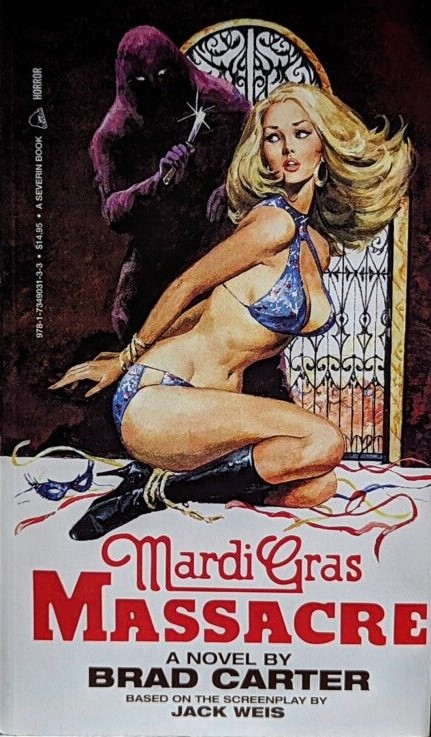 By BRAD CARTER (Severin; 2022)
By BRAD CARTER (Severin; 2022)
Horror novelist Brad Carter has for the last few years been involved in a most quixotic literary venture: turning out solidly written Severin Films published novelizations of the scuzziest exploitation films in existence. Carter commenced the cycle with CRUEL JAWS, based on Bruno Mattai’s ultra-crude 1995 JAWS pastiche, and continued with NIGHT OF THE DEMON, from the beyond-ridiculous 1980 Bigfoot trash-fest. With MARDI GRAS MASSACRE he turned to the 1978 Southern-fried slasher of that title.
MARDI GRAS MASSACRE is arguably the most famous film made by the New Orleans based no-budget auteur Jack Weis (whose other films include CRYPT OF DARK SECRETS and DEATH BRINGS ROSES). That, however, doesn’t mean the film is any good. In truth it’s a distractingly cheap and repetitive BLOOD FEAST wannabe, notable solely for the unusually graphic (though patently unconvincing) mutilation effects. Ideal material, in short, for the Brad Carter treatment.
As with his previous novelizations, Carter gives this one (which commences with quotations by Bertrand Russell and Leonardo da Vinci) more class than it needs or deserves. The characters are fleshed out with much greater depth than Weis offered, the story was expanded and the repetitive evisceration sequences have been lessened—although that doesn’t mean Carter skimps on the gore. Far from it, as Carter keeps the film’s grungy spirit intact, indicated by the chapter headings: “One Long Fucking Day,” “Here Comes the Big Bad Wolf,” “Nice Day for an Orgy,” etc.
As in the film, the book takes the form of a most wonky whodunit—wonky because we’re made aware precisely whodunit, and why, in the first chapter. The culprit is a New Orleans based man identified as John Smith (“it was the name he’d used for so long that his birth name was all but forgotten”) who’s abandoned his former life to serve the Aztec goddess Coatlicue. He goes about this by soliciting prostitutes reputed to be “evil” and taking them back to his apartment, where he ties them to a bed and rips out their hearts, all the while becoming quite aroused—a detail not present in the film. Other perverse Carter additions include a pair of severed heads that, in a nod to Lamberto Bava’s MACABRE (1980), Mr. Smith keeps in his refrigerator and uses for oral gratification.
Investigating the case are Detective Sergeant Frank Abraham and his partner Mayer. The author’s research into the intricacies of Southern police work is, unlike that of the film, quite thorough, and Abraham’s ill-advised tryst with Sherry, a local prostitute, is given shading that wasn’t present onscreen. Sherry, it turns out, is one of several prostitutes Smith is planning to sacrifice on Mardi Gras, in an outcome that has been changed considerably from that of the film.
If this book has an overriding flaw it’s that, simply, the Jack Weis imparted narrative is too imbecilic to justify Brad Carter’s high class treatment. Carter can’t refrain from poking fun at the material on occasion, as near the end when we get immortal line “Sherry said the first thing that came to mind: ‘What the fuck?’” and in a specially created female character, a pushy and insistent type who, in a nod to modern-day mores, is named Karen.
